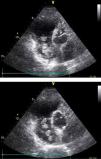We report the case of an 82-year-old female patient, institutionalized, obese, hypertensive, and with left hemiparesis due to recent stroke (less than a month previously), who was referred for breathing difficulties and hemodynamic instability. On physical examination, she was conscious but confused and uncooperative, cyanotic, tachypneic (38cpm), subfebrile (37.3°C), hypotensive (84/34mmHg) and tachycardic (120–130bpm). Auscultation revealed diffuse wheezing and rhonchi and a grade II systolic murmur, more audible over the left sternal border. The patient also had moderate edema of both ankles.
Blood gas analysis detected severe respiratory alkalosis. The ECG showed sinus rhythm, with left and right bundle branch block. Relevant laboratory results included elevated troponin I, D-dimers and BNP. Echocardiography revealed severe right chamber dilatation, depressed right ventricular systolic function (tricuspid annular plane systolic excursion: 11mm) and multiple cylindrical formations inside the right atrium, suggestive of thrombi (Figs. 1 and 2). There was mild tricuspid regurgitation and pulmonary artery systolic pressure was 45mmHg. In the light of these findings, further diagnostic exams were considered unnecessary and a diagnosis of high-risk pulmonary thromboembolism (PTE) was assumed. Anticoagulation with heparin was immediately begun, together with inotropic support with dopamine. In view of the patient's limited functional status and recent ischemic stroke, it was decided not to perform fibrinolysis or embolectomy and she died two days later.
Detection of right heart thrombi on transthoracic echocardiography in the context of PTE is uncommon (4–18%),1,2 although it is more frequent in high-risk PTE and is a marker of poor prognosis.3,4 In such cases, fibrinolysis and/or embolectomy should be performed as early as possible, followed by effective anticoagulation with heparin; anticoagulation alone is not effective. Without treatment mortality is 80–100%.5
Conflicts of interestThe authors have no conflicts of interest to declare.
Please cite this article as: Saraiva, F; Tromboembolia pulmonar de risco elevado com trombos na cavidade auricular direita. Rev Port Cardiol 2012. doi:10.1016/j.repc.2011.09.024








